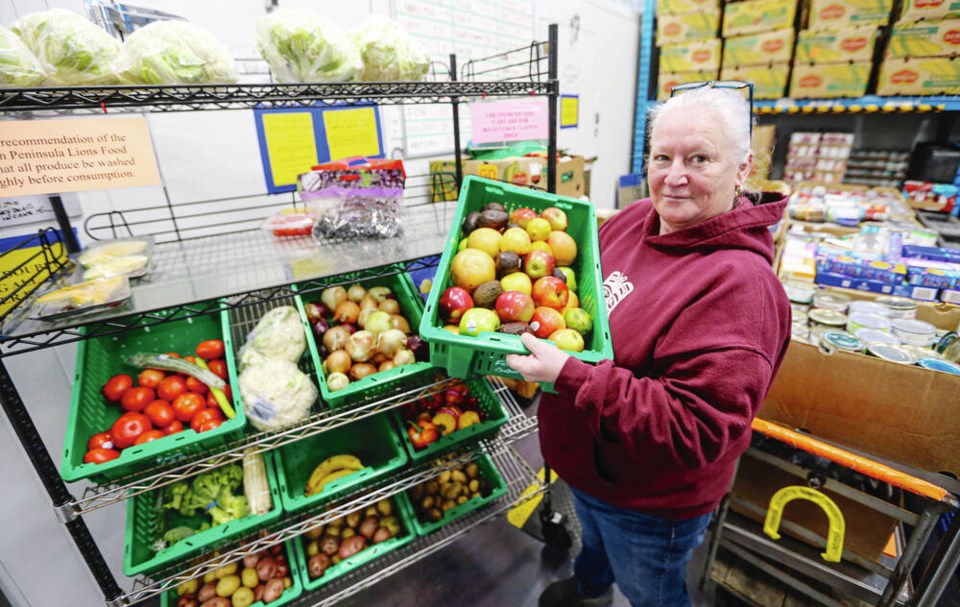Saturday morning, a woman I know was in a local grocery store when this guy scoops up all the remaining roasting chickens in the meat department, maybe eight of them, and beetles off toward the checkout.
Two minutes later he comes trundling down the aisle again, maybe a little pink at the ears, and puts the chickens back where he found them.
Was it a moment of guilt that made him return? Or stink-eye at the checkout? We’ve heard a few stories about people greedily loading up their carts, only to be turned away at the till. To paraphrase the navy: Prepare to repel hoarders.
The panic-buying seems to be settling down, but it has still meant more stress for food banks, who now find their suppliers rationing purchases as they attempt to restock stores.
“We support seven school breakfast programs, and we’re worried we won’t be able to keep that up,” Bev Elder, the executive director of the Saanich Peninsula Lions Food Bank, said Monday. Each school usually gets a case each of bananas, apples and oranges, but Elder was having trouble sourcing enough fruit.
Likewise, the amount of not-at-its-freshest-but-still-good items provided by two local Thrifty Foods stores dropped after shoppers emptied shelves. Donations fell from 20 boxes a day — produce, meat, dairy — to maybe eight.
Nonetheless, the food bank was humming with activity Monday, one of three mornings a week in which hungry people can collect groceries. They can also pop by on two other days for that “recovery food” from Thrifty.
The clients coming through the door aren’t necessarily who you would expect. Many are working poor, people whose paycheques don’t stretch far enough to provide both food on the table and a roof over their heads. Many are single. Thirteen per cent are elderly, some of them having suddenly found themselves both alone and broke.
“If you lose a partner, you lose a pension,” Elder notes.
Clients can come to the food bank once a month. When they do, they start by picking up a bag of basics — on Monday it contained Kraft Dinner and cans of soup, beans and fish. Everybody gets a litre of milk, plus one litre per child. They also choose from selections of proteins, breakfast foods, frozen vegetables and other goods. “We hand out seven tonnes of food a month,” Elder says. That’s not all: “Personal hygiene items are a big thing for us.”
Making all this work is a team of volunteers, maybe 35 to 40 of them in a given week. Most are retired. On Monday, a few of them were sorting through some just-arrived recovery food, separating the still-good from the bits that looked in danger of going off. Local pig farms get the culled stuff.
Also making things work are donations, whether of food or money. There might be a tangible satisfaction for us in giving the latter via a food drive, but in fact food banks would always prefer cash. The deals they have with suppliers let them squeeze the nickels. “We can turn your $1 into $3 worth of food,” Elder says.
Also, they can use the money to buy what they need when they need it, which is more useful than the chick peas from the back of somebody’s cupboard, the ones whose best-before date expired at the same time as Stephen Harper’s.
“All that does is create waste for us,” Elder says of the latter.
So, it was good news on Monday when the food bank got a nice-sized cheque from the Times Colonist Christmas Fund. That will help as the organization prepares Christmas hampers — gift cards to local grocers — for 320 to 340 recipients.
The money came from Times Colonist readers, who stepped up their generosity after COVID hit. That points to another reality: the shake-your-head stories about food-hoarding, gas-siphoning and selfishness might get the headlines, but in reality most people are eager to do the right thing.
The TC’s Louise Dickson found that on the weekend when she canvassed gas station lineups and found good-natured acceptance, not ill-tempered impatience. As the Christmas Fund proves every year, give people the chance to prove themselves unselfish, and most will.
jknox@timescolonist.com
How donate to the Christmas Fund
You can donate to the Times Colonist Christmas Fund by going to timescolonist.com/donate. That will take you to the CanadaHelps website, which is open 24 hours a day and provides an immediate tax receipt.
Or mail a cheque to the Times Colonist Christmas Fund, 201-655 Tyee Road, Victoria, B.C. V9A 6X5.
You can also use your credit card by phoning 250-995-4438 from 9 a.m. to 1 p.m. Monday through Friday.



